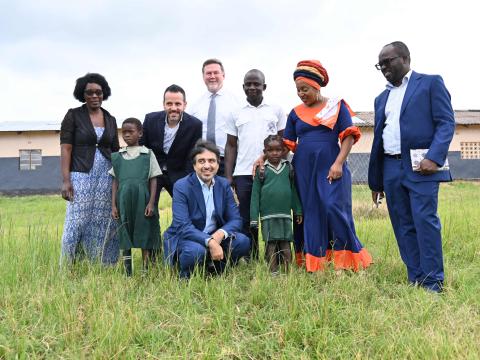World Vision launches Education Project dubbed Empowering Vulnerable Children with Education (EVE).

By Justine Njovu, Communications Officer, Zambia
Namwala District in Southern Province prides itself on livestock production and agriculture. However, this consequently contributes to high school dropout rates because boys are sent to herd cattle. At the same time, many girls are forced into early marriage in exchange for cattle or money.
For this reason, World Vision Zambia has launched a new education project, Empowering Vulnerable Children with Education (EVE), focusing on retaining at-risk children in schools in Namwala district.
The new EVE project will be implemented in partnership with ‘Education Above All Foundation’ and the Forum for African Women Educationalists in Zambia (FAWEZA) as a local implementing partner.

Speaking at the launch, World Vision Zambia Acting Integrated Programs Director, Mercy Chabu, called on collective responsibility and ownership among all partners involved during the three years life span of the EVE project.
“World Vision can only achieve all the planned activities under this project with the support and involvement of the government, traditional leaders, and the community,” she said.
‘Education Above All’ Chief Executive Officer, Fahad Al Sulaiti, reaffirmed the foundation’s commitment to providing quality primary education to over 14.5 million out-of-school children worldwide and retaining more than an additional 72,000 children most at risk of dropping out. The joint EVE project in Zambia will support seven thousand (7,000) of at-risk children.
“Getting children back to school is not enough; it must be effective and must have a strong mechanism to keep them in School,” he said.
And Minister of Education, Douglas Syakalima, commended World Vision, Education Above All, and FAWEZA for the initiative to supplement the government’s efforts to provide free and quality education to children in Zambia.

“The government of Zambia is working hard to provide accessible and equitable education for all children to prepare them for life. However, the needs are numerous and require support and partnership from everyone, including yourselves,” he said.
In addition, Namwala District Commissioner Ephraim Shandavu said the EVE project has come at the right time, as many boys drop out of school because they start to herd cattle at a tender age. At the same time, girls from impoverished homes are married off in exchange for cattle.
Learners under the EVE project will be supported to remain in school by enhancing the quality of education by providing teaching and learning materials and focusing on learner-centred education. The EVE project will also promote disability inclusion by providing mobility and assistive technologies to learners with disabilities and those that travel long distances to get to school.
Through partnerships with communities and schools, the EVE project is setting up Stay-In School committees (SISCS) that enhance the sustenance of retention for learners in targeted schools. The SISCS committees will be empowered with World Vision’s Citizen’s Voice and Action methodology, a form of social accountability that holds communities (citizens) and duty-bearers on their responsibility on the development agenda.
FAWEZA will provide support to the Stay-in school committees and promote gender responsiveness to the EVE project.
“We are particularly excited at employing a gender-responsive pedagogy in the thirty-seven schools we shall serve, which will bring about equality and equity among learners through the improvement of academic social and physical environments,” said FAWEZA Executive Director Costern Kanchele.
The EVE project aims at retaining 7000 at-risk children by providing a conducive environment for education through various interventions. Learners At-risk include those that cover long distances to school, those with limited access to education due to terminal illnesses or disabilities, children living in poverty and children retrieved from child marriage.